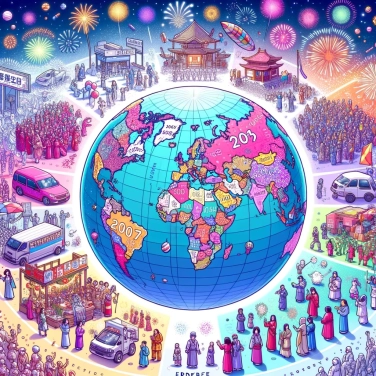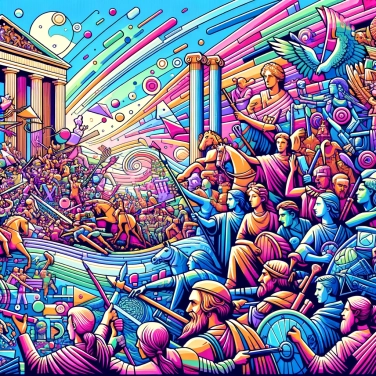Some countries celebrate New Year at different dates due to the use of different calendars. For example, the Gregorian calendar is the most widely used in the Western world, while other countries like China use the lunar calendar to determine the start of the new year.

Most countries use the Gregorian calendar, introduced in 1582 and based on the solar cycle. However, other cultures follow lunar or lunisolar calendars, counting months according to the phases of the moon. For example, the Chinese calendar is lunisolar: Chinese New Year therefore falls between late January and early February, depending on lunar cycles. Similarly, the Islamic calendar (or Muslim calendar) strictly follows the phases of the moon, which moves Islamic holidays about 11 days earlier each year compared to the standard solar calendar. That is why New Year, according to the calendar system adopted by a country, does not always fall on the same date around the world.
In different cultures, the date of the New Year largely depends on deeply rooted local traditions rather than just an official calendar. In Iran, for example, Norouz celebrates the spring rebirth, around March 21. Among Southeast Asian peoples, such as in Thailand, the New Year often coincides with a harvest festival, marked by very specific ceremonies and popular festivities, such as Songkran, the water festival. Among the Amazigh (Berbers of North Africa), the New Year, called Yennayer, often corresponds to the start of a new agricultural season and is traditionally celebrated around January 12. These celebrations follow a cycle of ancient local traditions, rhythmically tied to nature or daily life rather than just calculations of religious or classical solar calendars.
Religion clearly influences the dates chosen to celebrate the New Year. For example, the Islamic calendar is strictly lunar and begins with the Hijra, the departure of Muhammad to Medina. As a result, each year, the Muslim New Year shifts in relation to the solar calendar. For Hindus, it depends on the regions and traditions, but often the New Year is linked to specific religious festivals or mythological events. The same goes for Judaism: the Jewish New Year, called Rosh Hashanah, follows the Hebrew calendar and is usually celebrated around September or October, depending on the year. In all these religions, celebrating the New Year signifies a notion of spiritual renewal, forgiveness, and purification more than just the transition to a new year.
Throughout history, the choice of when to celebrate a new year has varied greatly among civilizations and eras. For example, in Ancient Rome, during the time of Julius Caesar, the beginning of the year was set on January 1st with the introduction of the Julian calendar in 45 BC. But elsewhere, such as in medieval France, the year sometimes began with the celebration of Easter, while in other regions of Europe, Christmas was the occasion for the new year. Over time, political or religious leaders often imposed a specific start to the year, sometimes simply to assert their authority or to signify a symbolic break with the past. Current dates therefore reflect these historical decisions that have gradually become entrenched in each tradition.
In Japan, it was traditional for several centuries to follow the Chinese lunar calendar to celebrate the New Year. It was not until 1873 that Japan officially adopted the Gregorian calendar and began to celebrate New Year on January 1st.
The Hebrew calendar, used in Israel and in many Jewish communities around the world, marks its New Year (Rosh Hashanah) between September and October according to the Gregorian calendar. Unlike the Gregorian calendar, it simultaneously combines the lunar cycle and the solar year.
In Ethiopia, the local calendar consists of 13 months, and the New Year, called 'Enkutatash', is celebrated on September 11 of the Gregorian calendar (or September 12 during leap years), with approximately a 7-year difference compared to the international calendar.
The Chinese Lunar New Year, which is also celebrated in several Asian countries, is based on a lunisolar calendar. It always falls between January 21 and February 20, depending on the appearance of the second new moon following the winter solstice.
Some cultures celebrate the New Year in spring because, historically and symbolically, this period marks the renewal of nature, crops, and a new agricultural cycle. For example, Nowruz, celebrated in Iran and several neighboring countries, marks the arrival of spring, symbolizing rebirth and renewal for millennia.
Calendar differences often stem from distinct historical and cultural evolutions. For example, the adoption of the Gregorian calendar in the 16th century, gradually replacing the Julian calendar, led to a divergence in calendar practices that some Orthodox countries have long maintained. Additionally, the lunar or lunisolar calendars used in regions of Asia or the Middle East originate from ancient cultures with traditions tied to their specific historical and civilizational contexts.
The Chinese New Year follows a traditional lunar calendar based on the movements of the Moon. It usually occurs between late January and mid-February, coinciding with the second new moon after the winter solstice. This explains the discrepancy compared to the solar calendar used in the Western Gregorian calendar.
There are several countries and regions that celebrate more than one New Year each year. For example, China, Korea, Vietnam, as well as some Southeast Asian countries and Jewish communities around the world, celebrate both the New Year according to their own traditional calendar and the one from the Western (Gregorian) calendar.
The main calendars used around the world include the Gregorian calendar (Western), the Chinese lunar calendar, the Hebrew calendar, the Muslim calendar (Hijri), and the Hindu calendar. Each calendar has its own calculation methods based on lunar, solar, or lunar-solar cycles, thus determining different dates for the celebration of the New Year.

0% of respondents passed this quiz completely!
Question 1/5